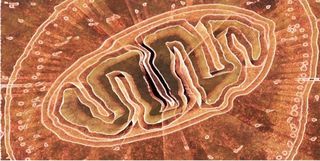
Health
Mitochondria and Mood
Mind your energy power packs for best mental and physical help.
Posted September 29, 2017

Most of us have heard about the mitochondria in high school biology class. It’s a part of all our cells (except red blood cells) and is considered “the powerhouse of the cell.” Cells that need more energy (like the heart cells and nervous system) have more mitochondria. There are up to 250,000 trillion mitochondria in our body.
History of the Mitochondria
It is theorized that the mitochondria once were bacteria that lived on their own. These little critters basically crawled into to cells that were one-celled organisms (called eukaryotic cells). It was a good relationship because the mitochondria used its new housing cell to gain more food and build more things—and the host cell used the mitochondria for extra energy which helped it build more things (which became organisms with more cells). This relationship allowed more complex organisms to form. From an evolutionary standpoint, humans became multicellular organisms because of all the extra energy from these mitochondria.
Why Do You Need to Learn About Your Mitochondria?
As a naturopathic doctor, I am always trying to understand the underlying cause of illness. Over the past few years of my practice, I have spent more and more time studying the mitochondria, for I am learning these little powerhouses play a clear role in why a person may feel healthy, or not. And if someone has a predisposition to mental illness (like anxiety, depression, bipolar, schizophrenia, autism, etc…) poor mitochondrial function will make these conditions much worse, and will make it much harder to feel better. Studies are clear that mitochondrial problems underlie these disorders.
It makes sense, for the nervous system needs a lot of energy to work properly. When mitochondria are working, they generate 36 ATP from a molecule of glucose. “ATP” stands for adenine triphosphate, and is the energy we need to live (if you are having flashbacks to high school biology, it’s OK, these will go away soon). If the cell mitochondria are not working well, it can only generate 2 ATP per molecule of glucose!
Wow—that is a lot less energy to live. What happens now is the body cannot create enough energy to keep things flowing into and out of the cell properly. It needs this energy to run pumps that hold chemicals in and outside the cell. As an analogy, a water dam needs energy to keep water pumped on the proper side of the dam. If the energy stops, the water gets too high on one side and ends up flooding everything. With the mitochondria, the molecules in the body (like calcium, sodium, potassium, and others) end up in the wrong place, and cell membranes start to break.
Once this happens, it sets off a cascade of events including lots of inflammation, oxidation (oxygen saturation) of fats and tissues, and eventually death of the cell (this cell death is caused ‘apoptosis’). When there’s too much inflammation, and too many nerve cells die, mental health problems will result. Sometimes, the genetic material (the DNA) in our cells that are the blueprint for our body will also get changed and broken. When DNA changes, the body’s structure and function can be compromised. Our cells have DNA in both our mitochondria as well as the nucleus of our cells. Both types are susceptible changes (called mutations). Beat up DNA will cause more inflammation, lower our nutrient levels (especially B vitamins), and even contribute to heart disease, diabetes, hypertension, and cancer.
How Do You Know If You Have Mitochondria Problems?
There are people who are born with mitochondrial DNA problems. Usually, they will have general or specific weaknesses, nervous system problems, mental health challenges, kidney disease and other conditions early in life. From a mental health perspective, they will be predisposed to depression, bipolar issues, anxiety, autism, etc…
Most people do not have mitochondrial problems from birth. Usually, it is a gradual process over time, where the mitochondria break down over a few decades. The best way to figure out if there is a mitochondrial issue is by checking on how you are feeling.
I always spend a lot of time with my patients to learn about their symptoms. What I have seen in patients with mitochondrial issues is fatigue that is unexplained despite plenty of sleep. I also see a lot of depression or imbalances in mood, and nervous system problems for which a neurologist finds no cause for (like tingling, numbness, pains, etc..).
Many of my patients are told they have 'chronic fatigue' or 'fibromyalgia' or, even worse, that it is all in their head, and they are just anxious or depressed. As a result, they need an antidepressant or anxiety medication to feel better. Often times, these medications do not work or will work for a short time and then stop working because the underlying issue is not fixed.
Are You A Highly Sensitive Person?
One main symptom I have seen regularly is a very sensitive person. In the book Highly Sensitive People (by Elaine Aron), it is described how some of us seem to not be able to handle the energy and input that comes at us from life. I believe many over-sensitive people actually have mitochondrial challenges.
These challenges often manifest as over-sensitivity to loud sounds, bring lights and life in general. Please visit here for more symptoms and signs, and to see if this profile might relate to your concerns.
Testing Mitochondria
Also, to help check into this further, it is useful to look at laboratory testing such as carnitine, iron levels, CoQ10, lactic and pyruvic acid, hormonal levels, zinc, and vitamin D. There may be other useful blood tests—it will depend on the case and are too many to discuss here. Other testing that is helpful is urine testing that can look at the health of the adrenal glands. Finally, genetic testing (like the MTHFR gene) and organic acid testing to asses candida (yeast), mold or oxalate overload can also help us understand if someone is more predisposed to mitochondrial issues. Sometimes, muscle biopsies can also confirm certain types of mitochondrial problems.
Please note, it is important to visit a doctor to get a proper workup, for the symptoms I mentioned to rule out other medical reasons. It is best not to assume your concerns are mitochondrial—so be sure to get the right checkups first to rule out more obvious issues.
Why Do Our Mitochondria Get Sick?
Most people with mitochondrial issues have secondary mitochondrial problems, which means their mitochondria were fine at birth, but things changed along the way. The things that can change mitochondrial function are: stress, toxins, drugs (both pharmaceutical and too much sugar, poor sleep, poor nutrition, heavy metal exposure, lack of exercise, and much more. In many cases, we are eating way too much food. In almost every case, it is not one of these things, but a few of them acting at the same time.
How Can You Fix Your Mitochondria?
There is no one way to fix the mitochondria. Because there are many factors that contribute, I would recommend making a number of changes at the same time. This is the general plan I find works - it is important to follow all the steps, for each plays an important role in mitochondrial healing.
9 Steps to Healing the Mitochondria:
1 – Get enough sleep: sleep is when the mitochondria heal and clean themselves up to rebuild for the next day’s energy generation. At least 7 hours a night. Also, try to get to bed by 11 p.m. for optimal sleep.
2 – Exercise: if you have the energy to do it, moderate movement of some kind every day is crucial. If you are too tired, then just try to take a 10-minute walk once a day and move your arms around. Or maybe gentle tai chi to move your circulation. Research shows that a blend of aerobics and strength training will help your body build the best mitochondria.
3 – Stress reduction: adrenaline is a major factor in making superoxides in our body and brain. Superoxides are the most powerful oxidants that destroy our mitochondria. Reducing stress hormones by working with a psychologist, and using techniques like meditation, yoga, and acupuncture are amazing ways to get the stress system in balance.
4 – Eat Mitochondria Building Foods: these foods include berries, green tea, apples, grass-fed meats, and culinary herbs like thyme and rosemary all have mitochondrial supportive phytochemicals. In general, a good Mediterranean style diet is anti-inflammatory and nourishing to your mitochondria.
5 – Stay Away from Mitochondria Destroyers: too much sugar, fried foods, corn syrup, excess fats will all take your mitochondria down. Also, I see so many patients using of over the counter drugs like pain relievers like they are candy. These are toxic and will contribute to the problem. Also, most medications are mitochondrial toxins, so check with your doctor to see if you really need it, or work with a naturopathic doctor to fix the underlying issues so you will not need it anymore (never just stop taking a prescribed drug without checking in with your doc).
6 – Clean up the toxins: Avoid smoking, alcohol, chemical cleaners, and pesticides. Check if your home has mold, for the toxins held by mold can get into the body and become a strong mitochondrial destroyer too. Finally, avoid all regular makeup, perfumes and anything else that couldn’t be put on a cracker and eaten.
7 – Try a short fast to clean out: try not eating for half a day—this helps the mitochondria clean up and fix themselves. Sometimes I have patients do a one-day fast once a week. Of course, if you have diabetes, blood sugar concerns, or are pregnant, do not fast. Check with your doc before starting a fasting program.
8 – Try some nutritional supplements: I generally recommend a good multiple vitamin (to help nourish the mitochondria), fish oil (which can fix membranes and balance against unhealthy diets) and a good quality probiotic (to heal digestion). Also, specific supplements like glutathione, N-acetyl cysteine, creatine, carnitine, CoQ 10, SAMe, B vitamins, and branched chain amino acids may be very helpful, depending on the particular case. Other supplementation might be useful in select cases to support the thyroid, testosterone and general stress hormone balance. Remember, supplements by themselves will probably not fix the problem, but used in a comprehensive program, these will help.
9 – Go herbal: I also will recommend St. John’s wort for anxiety and depressed patients with mitochondrial dysfunction, for it has been shown to help the mitochondria in the nerve cells regenerate. Hippocrates, the father of medicine, used St. John’s wort for mental health issues. If you are taking medications, check with your doctor before taking St. John's wort, for it can interact with many medications, including antidepressants, birth control, and 'blood thinning' drugs.
Note: If you are in Orange County, California I will be speaking on this topic at the Integrative Medicine for Mental Health conference on Saturday, September 30, 2017. Please come join us.
Peter Bongiorno, ND, LAc is President of the New York Association of Naturopathic Physicians. Visit drpeterbongiorno.com, InnerSourceHealth.com, and www.3UNeed.com and join him on Facebook and twitter — @drbongiorno.
References
Bongiorno PB. Mitochondria and Mood - abstract presentation at the Integrative Medicine for Mental Health conference September 2017, Orange County, California.
Boon Li Poon, P. et al. Pathological Significance of Mitochondrial Glycation International Journal of Cell Biology, Endocrine Abstracts (2012) 29 p554
Sun R. Dietary supplementation with fish oil alters the expression levels of proteins governing mitochondrial dynamics and prevents high-fat diet-induced endothelial dysfunction.Br J Nutr. 2014 Jul;112(2):145-53.
Scaglia F. The role of mitochondrial function in psychiatric disease. Dev Disabil Res Rev 2010;16:136–143
Wang et al. J. Hyperiform (St. John’s wort) Promotes Mitochondrial Function and Development of Oligodendrocytes. Neurochem 2011 119(3): 555-68



